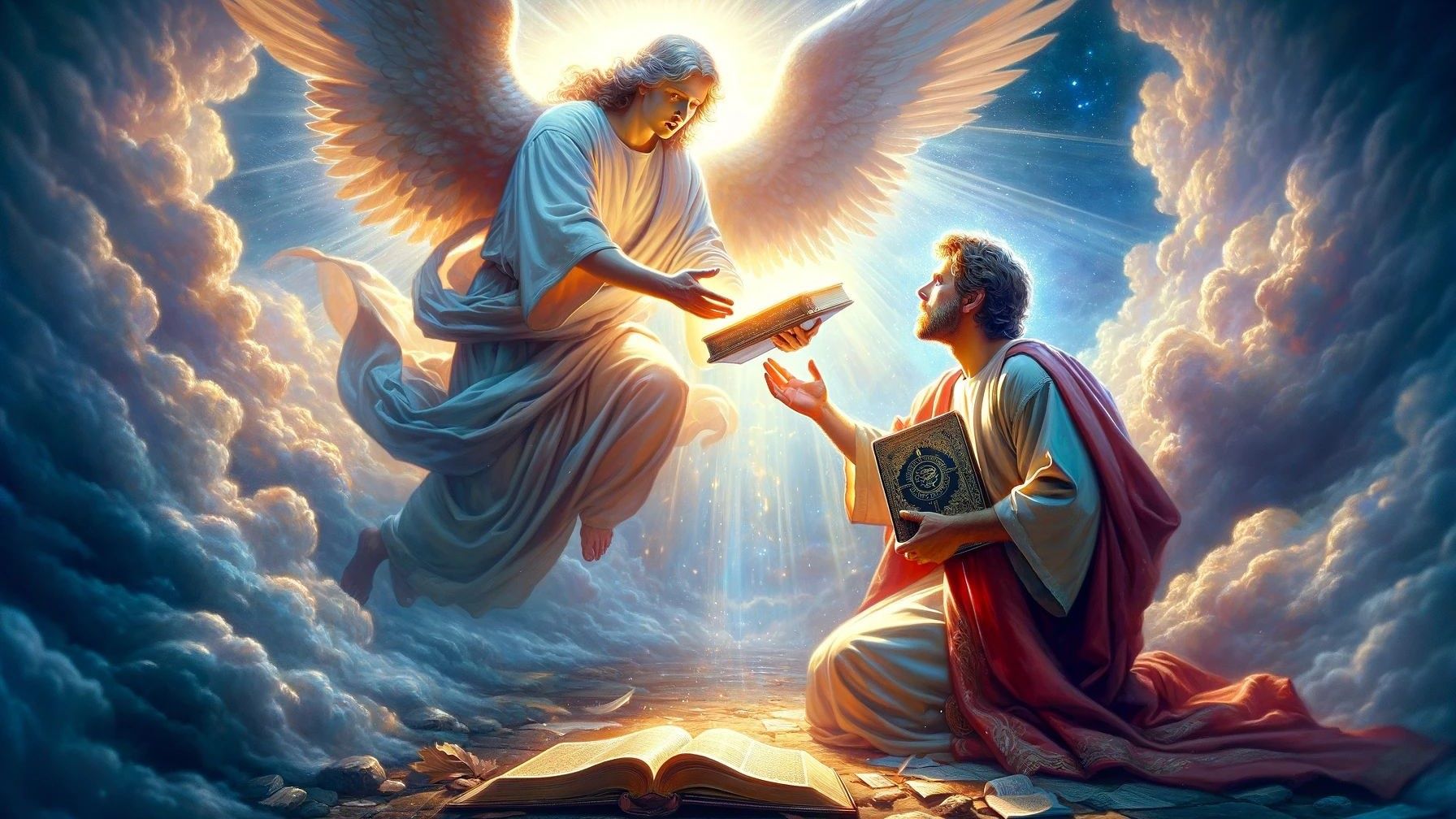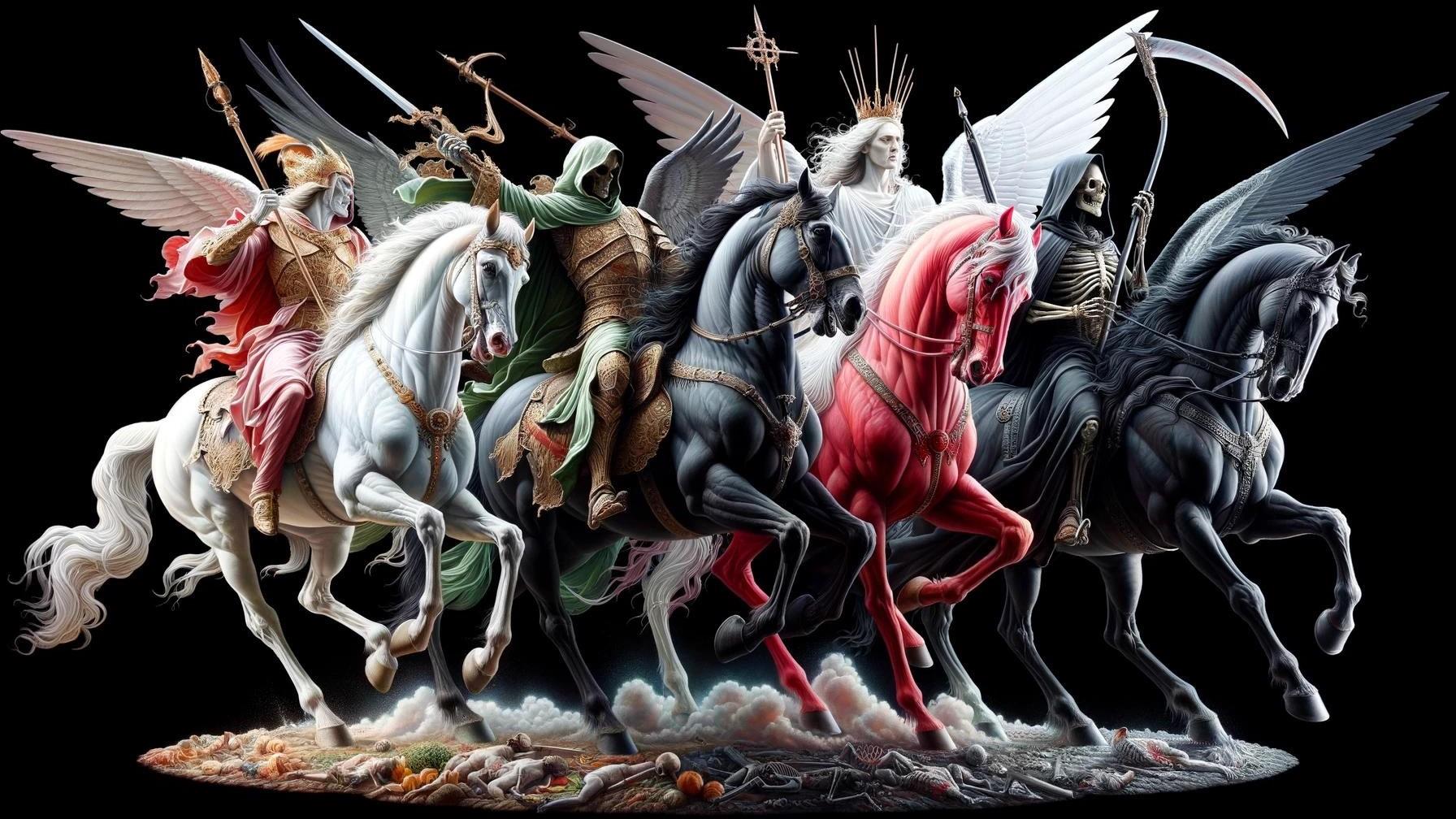Home>Bible Facts>What Does The Number 7 Mean In The Book Of Revelation


Bible Facts
What Does The Number 7 Mean In The Book Of Revelation
Published: February 11, 2024
Peter Smith, Editorial Director at Christian.net, combines deep insights into faith, politics, and culture to lead content creation that resonates widely. Awarded for his contributions to religious discourse, he previously headed a major organization for religious communicators, enhancing dialogue on faith's societal impacts.
Discover the significance of the number 7 in the Book of Revelation and its symbolic meaning. Explore fascinating Bible facts and interpretations.
(Many of the links in this article redirect to a specific reviewed product. Your purchase of these products through affiliate links helps to generate commission for Christian.net, at no extra cost. Learn more)
Table of Contents
Introduction
The Book of Revelation, the final book of the New Testament, is a profound and enigmatic text that has captivated readers for centuries. Within its pages, the number 7 holds a special significance, recurring frequently and symbolizing completeness, perfection, and divine fulfillment. Understanding the symbolic importance of the number 7 in the Book of Revelation provides profound insights into the spiritual and prophetic messages conveyed in this apocalyptic work.
Throughout the Book of Revelation, the number 7 appears repeatedly, representing divine intervention, spiritual completeness, and the fulfillment of God's purposes. This recurring motif serves as a powerful symbol, emphasizing the divine nature of the events and entities described within the text. From the seven churches to the seven seals, trumpets, and bowls, the number 7 permeates the narrative, underscoring the overarching themes of divine sovereignty and ultimate fulfillment.
As we delve into the significance of the number 7 in the Book of Revelation, we will explore its multifaceted symbolism and its profound implications for understanding the divine revelations and prophecies contained within this remarkable biblical book. Through a comprehensive examination of the seven churches, seals, trumpets, bowls, and spirits, we will uncover the rich tapestry of meaning woven into the fabric of the Book of Revelation, shedding light on its timeless relevance and enduring significance for believers and scholars alike.
Join us on this illuminating journey as we unravel the mysteries of the number 7 in the Book of Revelation, gaining a deeper understanding of its profound spiritual and prophetic implications. Through this exploration, we will gain valuable insights into the divine mysteries and eternal truths encapsulated within the symbolic framework of the number 7, enriching our appreciation of the Book of Revelation and its enduring impact on Christian theology and eschatology.
Read more: What Does The Book Of Revelation Mean?
The significance of the number 7 in the Book of Revelation
The number 7 holds profound significance in the Book of Revelation, symbolizing completeness, perfection, and divine fulfillment. Throughout the biblical text, the recurring motif of 7 underscores the divine nature of the events and entities described within its pages. This symbolic representation serves as a powerful testament to the overarching themes of divine sovereignty and ultimate fulfillment.
In the Book of Revelation, the number 7 is intricately woven into the narrative, appearing in various forms and contexts. It is a symbol of divine intervention, representing the completeness and perfection of God's plan for humanity. This symbolism is deeply rooted in the Old Testament, where the number 7 is associated with creation, rest, and divine order. As such, its presence in the Book of Revelation signifies the culmination of God's redemptive work and the establishment of His eternal kingdom.
The significance of the number 7 is evident in the seven churches, which are addressed in the opening chapters of Revelation. These seven churches represent the universal church as a whole, encompassing the diverse spiritual conditions and challenges faced by believers throughout history. The number 7, in this context, signifies the completeness of the church, reflecting the comprehensive nature of God's message to His people.
Furthermore, the seven seals, seven trumpets, and seven bowls described in the Book of Revelation are emblematic of divine judgment, culmination, and consummation. Each series of sevens represents a complete cycle of events, ultimately leading to the fulfillment of God's purposes and the establishment of His eternal kingdom. The symbolism of 7 in these apocalyptic visions underscores the divine authority and sovereignty behind the unfolding of eschatological events, emphasizing the completeness and perfection of God's plan for the world.
Moreover, the seven spirits, as mentioned in Revelation 1:4, symbolize the fullness and perfection of the Holy Spirit. This depiction reinforces the divine nature of the Holy Spirit and His pervasive influence in the world, bringing about the fulfillment of God's redemptive plan.
In essence, the significance of the number 7 in the Book of Revelation extends beyond mere numerical symbolism. It serves as a profound theological and eschatological motif, encapsulating the completeness, perfection, and divine fulfillment inherent in God's redemptive work. By understanding the multifaceted symbolism of the number 7 in the Book of Revelation, believers gain deeper insights into the divine mysteries and eternal truths embedded within this apocalyptic masterpiece, enriching their faith and understanding of God's ultimate plan for humanity.
The seven churches
The opening chapters of the Book of Revelation introduce the concept of the seven churches, which hold significant symbolic and practical implications for believers. These seven churches, namely Ephesus, Smyrna, Pergamum, Thyatira, Sardis, Philadelphia, and Laodicea, were actual congregations in Asia Minor at the time of John's writing. However, their inclusion in the apocalyptic vision serves a broader purpose, representing the universal church throughout history.
Each of the seven churches receives a specific message from Jesus Christ, highlighting their unique spiritual conditions, commendations, and admonitions. The number 7, in this context, signifies completeness and comprehensiveness, indicating that the messages to these churches encompass the entire spectrum of challenges, strengths, and spiritual states found within the universal church.
The church of Ephesus is commended for its perseverance and discernment but is admonished for forsaking its first love. Smyrna, facing persecution and poverty, is encouraged to remain faithful in the face of tribulation. Pergamum is praised for holding fast to its faith but is rebuked for tolerating false teachings. Thyatira is commended for its love, faith, and service but is warned against the influence of a false prophetess. Sardis, though having a reputation for being alive, is urged to wake up and strengthen what remains. Philadelphia, known for its endurance and faithfulness, is promised protection and vindication. Laodicea, characterized by lukewarmness, is exhorted to repent and embrace genuine spiritual wealth.
The messages to these seven churches serve as timeless exhortations and warnings for the universal church, addressing various spiritual conditions and challenges that have persisted throughout history. The symbolic significance of the number 7 underscores the completeness and relevance of these messages for all believers, emphasizing the universal applicability of the spiritual insights and directives conveyed to the seven churches.
In essence, the seven churches in the Book of Revelation represent the diverse spiritual states and conditions found within the universal church, encompassing the entire spectrum of challenges, strengths, and admonitions relevant to believers throughout history. The symbolic significance of the number 7 underscores the completeness and comprehensiveness of these messages, highlighting their enduring relevance and applicability for the church in every age.
The seven seals
The seven seals, as depicted in the Book of Revelation, represent a series of apocalyptic visions that unveil the divine judgments and events leading to the culmination of God's redemptive plan. These seals, described in Revelation chapters 5-8, are an integral part of the prophetic narrative, symbolizing the unfolding of eschatological events and the ultimate fulfillment of God's purposes.
The significance of the number 7 is prominently displayed in the context of the seven seals, signifying completeness, perfection, and divine authority. Each seal, when broken, reveals a specific vision or event that contributes to the overall progression of God's redemptive plan. The sequential unveiling of the seals underscores the comprehensive nature of these apocalyptic events, culminating in the establishment of God's eternal kingdom.
The first four seals, commonly known as the Four Horsemen of the Apocalypse, depict the emergence of a white, red, black, and pale horse, each representing conquest, war, famine, and death, respectively. These symbolic images convey the pervasive nature of suffering and turmoil that will characterize the period preceding the ultimate fulfillment of God's kingdom. The symbolism of the four horsemen underscores the far-reaching impact of these apocalyptic events, emphasizing their universal significance and profound implications for humanity.
The opening of the fifth seal reveals the souls of martyrs crying out for justice, highlighting the persecution and suffering endured by faithful believers throughout history. This poignant vision underscores the ultimate vindication and recompense promised to those who remain steadfast in their faith, despite facing adversity and persecution.
The sixth seal unveils cosmic disturbances, including a great earthquake and celestial phenomena, signaling the awe-inspiring and cataclysmic nature of the events preceding the culmination of God's redemptive plan. These cosmic upheavals symbolize the profound and transformative nature of the eschatological events, heralding the imminent arrival of God's divine judgment and the establishment of His eternal kingdom.
The opening of the seventh seal initiates a period of silence in heaven, signifying the solemn anticipation of the forthcoming divine judgments and the consummation of God's redemptive purposes. This climactic moment sets the stage for the subsequent series of apocalyptic visions, including the seven trumpets and seven bowls, which further unfold the divine judgments and culminate in the establishment of God's eternal kingdom.
In essence, the seven seals in the Book of Revelation represent a comprehensive and sequential unveiling of apocalyptic events, symbolizing the divine judgments, cosmic upheavals, and ultimate fulfillment of God's redemptive plan. The symbolic significance of the number 7 underscores the completeness and perfection of these apocalyptic visions, emphasizing their profound theological and eschatological implications for believers and the world at large.
The seven trumpets
The seven trumpets, as delineated in the Book of Revelation, constitute a series of apocalyptic visions that herald divine judgments and cataclysmic events, signaling the culmination of God's redemptive plan. These trumpets, described in Revelation chapters 8-11, serve as powerful symbols of divine intervention, cosmic upheaval, and the impending consummation of God's purposes. The sequential sounding of the trumpets underscores the comprehensive and progressive nature of these apocalyptic events, each trumpet heralding a significant development in the unfolding eschatological narrative.
The significance of the number 7 is prominently manifested in the context of the seven trumpets, symbolizing completeness, divine authority, and the ultimate fulfillment of God's sovereign plan. Each trumpet blast unleashes a specific judgment or event, contributing to the escalating intensity of divine interventions and signaling the impending establishment of God's eternal kingdom. The symbolism of the seven trumpets underscores the all-encompassing nature of these apocalyptic visions, emphasizing their universal significance and profound implications for humanity.
The sounding of the first trumpet results in hail and fire mingled with blood, cast upon the earth, causing devastation and destruction. This cataclysmic event serves as a harbinger of the divine judgments that will be unleashed upon the world, signaling the onset of God's righteous retribution and the impending upheaval of the natural order.
The second trumpet blast heralds a great burning mountain cast into the sea, turning a third of the sea into blood and causing the death of a third of living creatures in the sea. This apocalyptic imagery underscores the far-reaching impact of divine judgments, emphasizing the pervasive nature of the impending cataclysms and their profound consequences for the natural world.
The sounding of the third trumpet results in a great star, called Wormwood, falling from heaven and contaminating a third of the rivers and springs, causing widespread bitterness and calamity. This symbolic vision underscores the pervasive nature of divine judgments, highlighting their profound impact on the earth's ecosystems and the well-being of humanity.
The fourth trumpet blast unveils celestial disturbances, darkening a third of the sun, moon, and stars, signaling the cosmic upheavals preceding the culmination of God's redemptive plan. This awe-inspiring imagery underscores the transformative and cataclysmic nature of the impending eschatological events, heralding the imminent arrival of God's divine judgment and the establishment of His eternal kingdom.
The sounding of the fifth trumpet unleashes a swarm of locusts, symbolizing demonic forces and spiritual torment, inflicting anguish upon those who do not bear the seal of God. This haunting vision underscores the spiritual warfare and tribulation that will characterize the period preceding the ultimate fulfillment of God's redemptive plan, emphasizing the profound spiritual implications of the impending divine judgments.
The sixth trumpet heralds the release of four angels bound at the great river Euphrates, unleashing a vast army of horsemen, symbolizing divine judgment and the cataclysmic events that will engulf the world. This apocalyptic imagery underscores the awe-inspiring and transformative nature of the eschatological events, signaling the imminent arrival of God's divine judgment and the establishment of His eternal kingdom.
The sounding of the seventh trumpet initiates a climactic moment in the apocalyptic narrative, heralding the proclamation of God's eternal reign and the culmination of His redemptive plan. This pivotal event sets the stage for the subsequent series of apocalyptic visions, further unfolding the divine judgments and culminating in the establishment of God's eternal kingdom.
In essence, the seven trumpets in the Book of Revelation represent a progressive and escalating series of divine judgments and cataclysmic events, symbolizing the transformative upheavals and the ultimate fulfillment of God's redemptive plan. The symbolic significance of the number 7 underscores the completeness and perfection of these apocalyptic visions, emphasizing their profound theological and eschatological implications for believers and the world at large.
The seven bowls
The seven bowls, also known as the seven vials, constitute a series of apocalyptic visions described in the Book of Revelation, specifically in chapters 15 and 16. These bowls of divine wrath represent the culmination of God's judgment upon the earth, signaling the impending consummation of His redemptive plan and the establishment of His eternal kingdom. The sequential pouring out of the bowls underscores the comprehensive and escalating nature of these apocalyptic events, each bowl unleashing a specific and devastating judgment upon the unrepentant world.
The significance of the number 7 is prominently manifested in the context of the seven bowls, symbolizing completeness, divine perfection, and the ultimate fulfillment of God's sovereign plan. Each bowl of divine wrath represents a decisive and irrevocable judgment, contributing to the escalating intensity of God's righteous retribution and signaling the imminent establishment of His eternal kingdom. The symbolism of the seven bowls underscores the all-encompassing nature of these apocalyptic visions, emphasizing their universal significance and profound implications for humanity.
The pouring out of the first bowl results in loathsome and malignant sores afflicting those who bear the mark of the beast, symbolizing the divine judgment upon those who have aligned themselves with the forces of evil. This devastating affliction underscores the pervasive and inescapable nature of God's righteous retribution, signaling the profound consequences of embracing spiritual darkness and rebellion against God.
The second bowl unleashes judgment upon the sea, turning it into blood and causing the death of every living creature in the sea. This cataclysmic event underscores the far-reaching impact of divine judgments, emphasizing the pervasive nature of the impending cataclysms and their profound consequences for the natural world.
The pouring out of the third bowl results in the contamination of the rivers and springs, turning them into blood, symbolizing the divine judgment upon the sources of life and sustenance. This apocalyptic imagery underscores the pervasive and inescapable nature of God's righteous retribution, highlighting the profound consequences of defying His divine order and rejecting His redemptive grace.
The fourth bowl unveils scorching heat, causing intense suffering and anguish upon the unrepentant, emphasizing the relentless and unyielding nature of God's righteous retribution. This devastating affliction underscores the inescapable consequences of embracing spiritual darkness and rejecting the offer of divine redemption.
The pouring out of the fifth bowl results in darkness engulfing the kingdom of the beast, plunging it into spiritual and moral decay. This cataclysmic event underscores the far-reaching impact of divine judgments, emphasizing the pervasive nature of the impending cataclysms and their profound consequences for those who have embraced spiritual darkness and rebellion against God.
The sixth bowl heralds the drying up of the Euphrates River, preparing the way for the kings of the east, symbolizing the divine judgment and the gathering of the forces of evil for the ultimate confrontation with God. This apocalyptic imagery underscores the awe-inspiring and transformative nature of the eschatological events, signaling the imminent arrival of God's divine judgment and the establishment of His eternal kingdom.
The pouring out of the seventh bowl initiates a climactic moment in the apocalyptic narrative, unleashing a series of cataclysmic events, culminating in the proclamation, "It is done!" This pivotal event sets the stage for the ultimate fulfillment of God's redemptive plan, signaling the imminent establishment of His eternal kingdom and the definitive triumph of righteousness over evil.
In essence, the seven bowls in the Book of Revelation represent a comprehensive and irrevocable outpouring of divine wrath, symbolizing the culmination of God's judgment upon the unrepentant world and the impending establishment of His eternal kingdom. The symbolic significance of the number 7 underscores the completeness and perfection of these apocalyptic visions, emphasizing their profound theological and eschatological implications for believers and the world at large.
The seven spirits
In the Book of Revelation, the concept of the seven spirits is a profound and enigmatic aspect of the apocalyptic vision presented to the apostle John. The mention of the seven spirits is found in Revelation 1:4, where John greets the seven churches in Asia Minor, invoking grace and peace from "him who is and who was and who is to come, and from the seven spirits who are before his throne." This cryptic reference to the seven spirits has sparked theological discussions and interpretations throughout the centuries, inviting believers to delve deeper into its symbolic significance and spiritual implications.
The symbolism of the number 7, as manifested in the seven spirits, signifies completeness, fullness, and perfection. The seven spirits before the throne of God represent the multifaceted attributes and manifestations of the Holy Spirit. This depiction emphasizes the comprehensive and all-encompassing nature of the Holy Spirit's influence and ministry, encompassing the fullness of divine attributes and empowering believers for spiritual fulfillment and service.
The prophet Isaiah, in the Old Testament, provides a glimpse into the nature of the sevenfold Spirit of God, portraying the Spirit as embodying wisdom, understanding, counsel, might, knowledge, fear of the Lord, and delight in the fear of the Lord (Isaiah 11:2). This portrayal underscores the multifaceted and comprehensive nature of the Holy Spirit's attributes, encompassing the full spectrum of divine wisdom, guidance, empowerment, and reverence for God.
Furthermore, the depiction of the seven spirits before the throne serves as a powerful symbol of divine perfection and completeness, emphasizing the all-encompassing nature of the Holy Spirit's ministry and influence. The presence of the seven spirits before the throne underscores the pervasive and omnipotent nature of the Holy Spirit's work in the world, bringing about the fulfillment of God's redemptive plan and empowering believers for spiritual growth, service, and witness.
In essence, the symbolism of the seven spirits in the Book of Revelation underscores the completeness, fullness, and perfection of the Holy Spirit's attributes and ministry. This depiction serves as a profound reminder of the all-encompassing nature of the Holy Spirit's influence in the world, empowering believers for spiritual fulfillment, service, and the advancement of God's kingdom. The multifaceted symbolism of the seven spirits invites believers to embrace the fullness of the Holy Spirit's work in their lives, yielding to His guidance, empowerment, and transformative presence.
Conclusion
In conclusion, the significance of the number 7 in the Book of Revelation is a profound and recurring motif that symbolizes completeness, perfection, and divine fulfillment. Throughout the apocalyptic narrative, the number 7 permeates the text, underscoring the overarching themes of divine sovereignty and the ultimate consummation of God's redemptive plan. From the seven churches to the seven seals, trumpets, bowls, and spirits, the symbolic representation of 7 serves as a powerful testament to the divine nature of the events and entities described within the Book of Revelation.
The seven churches, addressed in the opening chapters of Revelation, represent the universal church as a whole, encompassing the diverse spiritual conditions and challenges faced by believers throughout history. The messages to these churches serve as timeless exhortations and warnings, highlighting the enduring relevance and applicability of the spiritual insights and directives conveyed to the seven churches.
Furthermore, the seven seals, trumpets, and bowls depict a series of apocalyptic visions that unveil divine judgments, cosmic upheavals, and the ultimate fulfillment of God's redemptive plan. The sequential unfolding of these sevens symbolizes the comprehensive and progressive nature of the eschatological events, ultimately leading to the establishment of God's eternal kingdom.
Moreover, the depiction of the seven spirits before the throne underscores the multifaceted attributes and manifestations of the Holy Spirit, emphasizing the comprehensive and all-encompassing nature of the Spirit's influence and ministry.
In essence, the significance of the number 7 in the Book of Revelation extends beyond mere numerical symbolism. It serves as a profound theological and eschatological motif, encapsulating the completeness, perfection, and divine fulfillment inherent in God's redemptive work. By understanding the multifaceted symbolism of the number 7 in the Book of Revelation, believers gain deeper insights into the divine mysteries and eternal truths embedded within this apocalyptic masterpiece, enriching their faith and understanding of God's ultimate plan for humanity. The symbolic significance of the number 7 underscores the completeness and perfection of these apocalyptic visions, emphasizing their profound theological and eschatological implications for believers and the world at large.














